
By Shulamith Lala Ashenberg Straussner DSW
A prime specialist source and path textual content, this publication presents sensible tips for treating consumers with substance use problems in a number of contexts. professional individuals current significant overview and therapy methods including special options for intervening with specific elements. medical thoughts are sincerely defined and illustrated with precious case examples. vital themes contain damage aid; suggestions for operating with relations; and how one can meet the wishes of particular populations, together with ladies, teens, older adults, LGBT consumers, and people with often encountered co-occurring problems.
New to This Edition
*Revised to mirror present learn and scientific advances; up-to-date for DSM-5.
*Chapters on trauma-informed care, cognitive-behavioral remedy, and complementary/alternative approaches.
*Chapters on neurobiology and behavioral addictions.
*Significantly revised chapters on relatives therapy and twin disorders.
Read Online or Download Clinical Work with Substance-Abusing Clients PDF
Similar psychiatry books
New PDF release: Alternative Perspectives on Psychiatric Calidation: DSM,
The various present debates approximately validity in psychiatry and psychology are predicated at the unforeseen failure to validate common diagnostic different types. the popularity of this failure has led to, what Thomas Kuhn calls, a interval of remarkable technology within which validation difficulties are given elevated weight, choices are proposed, methodologies are debated, and philosophical and old analyses are visible as extra correct than traditional.
Get Why Everyone (Else) Is a Hypocrite: Evolution and the PDF
We're all hypocrites. Why? Hypocrisy is the average kingdom of the human mind.
Robert Kurzban indicates us that the foremost to knowing our behavioral inconsistencies lies in figuring out the mind's layout. The human brain contains many really expert devices designed via the method of evolution by means of common choice. whereas those modules occasionally interact seamlessly, they don't consistently, leading to impossibly contradictory ideals, vacillations among persistence and impulsiveness, violations of our meant ethical ideas, and overinflated perspectives of ourselves.
This modular, evolutionary mental view of the brain undermines deeply held intuitions approximately ourselves, in addition to various medical theories that require a "self" with constant ideals and personal tastes. Modularity means that there is not any "I. " as an alternative, every one folks is a contentious "we"--a number of discrete yet interacting platforms whose consistent conflicts form our interactions with each other and our adventure of the world.
In transparent language, jam-packed with wit and wealthy in examples, Kurzban explains the roots and implications of our inconsistent minds, and why it truly is completely typical to think that everybody else is a hypocrite.
Because the e-book of Miller and Rollnick's vintage Motivational Interviewing, MI has turn into highly renowned as a device for facilitating many alternative types of optimistic habit swap. MI is more and more getting used to assist participants mobilize their power, dedication, and private assets for addressing a variety of psychological wellbeing and fitness issues.
History of Psychotherapy: Continuity and Change by John C. Norcross PDF
Released twenty years in the past, the 1st version of heritage of Psychotherapy (1992) continues to be thought of the main complete and authoritative source at the topic. construction at the luck of its predecessor, this new version presents well timed updates to mirror either the continuity and alter in psychotherapy and contours extra thought, examine, perform, and coaching.
- Der Meskalinrausch: Seine Geschichte und Erscheinungsweise
- The Different Drum: Community Making and Peace
- Coping, Behavior, and Adaptation in Prison Inmates
- Foundations of Biochemical Psychiatry
- Mad Tales from the Raj: The European Insane in British India, 1800-1858
- Drug-Drug Interaction Primer: A Compendium of Case Vignettes for the Practicing Clinician
Extra info for Clinical Work with Substance-Abusing Clients
Example text
McLellan, A. T. (2010). : Revisiting the Betty Ford Institute consensus panel definition. Journal of Social Work Practice in the Addictions, 10(1), 109–113. McLellan, A. , Corse, S. , & Alterman, A. I. (1992). The Addiction Severity Index ten years later. Journal of Substance Abuse Treatment, 9, 199–213. McLellan, A. , Lewis, D. , O’Brien, C. , & Kleber, H. D. (2000). Drug dependence, a chronic medical illness. Journal of the American Medical Association, 284(13), 1689–1695. Menninger, K. (1938).
Diagnostic and statistical manual of mental disorders (5th ed). Arlington, VA: Author. Azmitia, E. C. (2001). Impact of drugs and alcohol on the brain through the life cycle: Knowledge for social workers. Journal of Social Work Practice in the Addictions, 1(3), 41–63. Babor, T. F, de la Fuente, J. , & Grant, M. (1992). AUDIT: The Alcohol Use Disorders Identification Tests: Guidelines for use in primary health care. Geneva: World Health Organization. An Overview 33 Beck, A. , Wright, F. , Newman, C.
As noted, there are tremendous variations in the background and characteristics of substance abusers, in the kinds of substances being abused, and in the impact of these chemicals on the users and their significant others. Nonetheless, certain characteristics and behavioral patterns are common to many substance abusers and provide basic assessment clues. All clients whose behavior is highly volatile and unpredictable or whose history indicates interpersonal, occupational, financial, and/or legal problems should be questioned about possible SUD.



